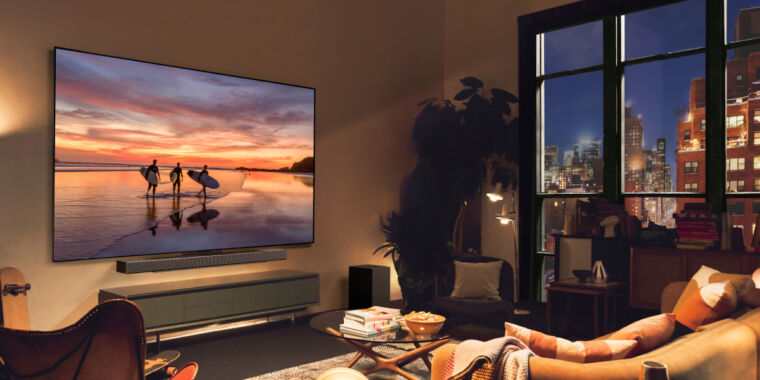The move embodies how ads are a growing and virtually inescapable part of the TV-viewing experience—even when you’re not watching anything.
As you might have expected, LG didn’t make a big, splashy announcement to consumers or LG TV owners about this new ad format. Instead, and ostensibly strategically, the September 5 announcement was made to advertisers. LG appears to know that screensaver ads aren’t a feature that excites users. Still, it and many other TV makers are happy to shove ads into the software of already-purchased devices.
LG TV owners may have already spotted the ads or learned about them via FlatpanelsHD, which today reported seeing a full-screen ad on the screensaver for LG’s latest flagship TV, the G4. “The ad appeared before the conventional screensaver kicks in," per the website, “and was localized to the region the TV was set to.”
LG has put these ads on by default, according to FlatpanelsHD, but you can disable them in the TVs’ settings. Still, the introduction of ads during a screensaver, shown during a pause in TV viewing that some TVs use as an opportunity to show art or personal photos that amplify the space, illustrates the high priority that ad dollars and tracking have among today’s TVs—even new top-of-the-line ones.
The addition of screensaver ads that users can disable may sound like a comparatively smaller disruption as far as TV operating system (OS) ads go. But the incorporation of new ad formats into TV OSes’ various nooks and crannies is a slippery slope. Some TV brands are even centered more on ads than selling hardware. Unfortunately, it’s up to OS operators and TV OEMs to decide where the line is, including for already-purchased TVs. User and advertiser interests don’t always align, making TV streaming platforms without third-party ads, such as Apple TV, increasingly scarce gems.



My Samsung I bought last year required an Internet connection during setup, but after it updated it “allowed” me to disconnect it. Just to be extra safe I connected it to a guest network that I changed the password on so it couldn’t remember the credentials. The menus have ads (that never change), but I set the TV to default to the last HDMI port when it turns on.
I wish they had an AOSP sort of approach to TV where I could install a new ROM and customize the TV OS with whatever changes I’d like, so I didn’t need extra devices to view Plex and my streaming channels. DRM shuts that dream down pretty quickly though.
I hope that some privacy forward brands will emerge, but there just doesn’t seem to be consumer demand or awareness.